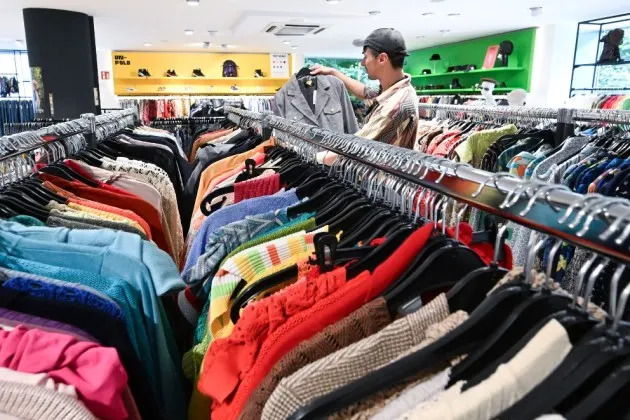News
Resale’s Growth Outpaces Broader Apparel and Footwear Market

As consumers become more aware of the impact of their purchases, both on the environment and their budgets, the clothing resale industry has seen significant growth. A new report shows that sector is now outpacing the growth of the overall apparel, accessories and footwear industry.
Data from consumer research group Consumer Edge shows year-over-year spending growth in clothing and footwear resale retail accelerated sharply from a summer low of -3 percent to its highest point of the year in October at 5 percent. Analysts saw a wider outperformance of resale growth compared to the broader fashion sector, which they say suggests a more sustained consumer shift.
More from Sourcing Journal
“Pure-play resale companies have been gradually growing share of the overall apparel, accessories and footwear industry as many consumers look for alternatives to traditional retail,” the report said. “This growth does not even take into account the many brands that have started to incorporate resale into their own platforms and stores.”
The report pointed to brands such as athletic footwear and apparel company On , which recently launched its own resale site. Companies are increasingly trying to carve out market share in the growing secondary market.
Peer-to-peer online marketplaces Grailed and Depop lead the pack in resale retail growth, followed by Vinted . Traditional brick-and-mortar thrifters City Thrift, Uptown Cheapskate, Savers and Texas Thrift also saw growth. Omni-channel retailers such as Clothes Mentor and Goodwill also ranked on Consumer Edge’s list of top performers.
And while Gen Z has led the resale charge recently, Consumer Edge found that shoppers aged 25-44 increased their spending share the most, upping their portion of the resale sub-industry spend by more than 6 percent in the first 10 months of 2024 compared to the same period a year ago. Consumer Edge’s data found that Depop and ThredUp are overexposed to this age group, suggesting they could reap the benefits in 2025 if this consumer shift persists.
The biggest spenders in the resale category in 2024 tend to be those in mid-range income groups, with consumers making between $80,001-$100,000 per year leading, followed by $40,000-$60,000 and $60,001-$80,000. Consumer Edge says Goodwill and Salvation Army are positioned well to take advantage of these consumers as both brands are overexposed to these groups. Goodwill in particular has positioned itself well to take advantage of the demand for resale after investing significantly in its e-commerce business, allowing the retailer to connect with a wider range of consumers across platforms.
With the threat of new tariffs and other potentially inflationary measures that could come into effect in 2025, resale retailers may be able to carry this momentum forward for even greater growth in the year to come.

